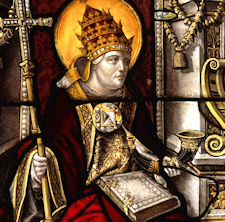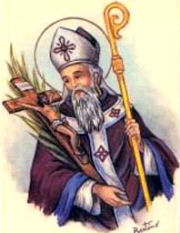Saints Cornelius, Pope
Cyprian, Bishop, Martyrs
St. Cornelius
 Pope Cornelius (251-253) was the successor to Pope Fabian. During his reign a controversy arose concerning the manner of reinstating those who had fallen from the faith under the duress of persecution. The Novatians accused the Pope of too great indulgence and separated themselves from the Church. With the help of St. Lucina, Cornelius transferred the remains of the princes of the apostles to places of greater honor. On account of his successful preaching the pagans banished him to Centumcellae, where he died. St. Cyprian sent him a letter of condolence. At the time of Pope Cornelius there were at Rome forty-six priests, seven deacons, seven subdeacons, forty-two acolytes, fifty-two clerics and more than five hundred widows who were supported by the Church (according to Cornelius’ letter to Bishop Fabian of Antioch).
Pope Cornelius (251-253) was the successor to Pope Fabian. During his reign a controversy arose concerning the manner of reinstating those who had fallen from the faith under the duress of persecution. The Novatians accused the Pope of too great indulgence and separated themselves from the Church. With the help of St. Lucina, Cornelius transferred the remains of the princes of the apostles to places of greater honor. On account of his successful preaching the pagans banished him to Centumcellae, where he died. St. Cyprian sent him a letter of condolence. At the time of Pope Cornelius there were at Rome forty-six priests, seven deacons, seven subdeacons, forty-two acolytes, fifty-two clerics and more than five hundred widows who were supported by the Church (according to Cornelius’ letter to Bishop Fabian of Antioch).
Excerpted from The Church’s Year of Grace, Pius Parsch
Patron: against ear ache; against epilepsy; fever; cattle; domestic animals.
Symbols: horn and triple papal cross; cows or oxen; font; tall cross; sword; also papal symbols of tiara, church and/or triple cross; martyr’s crown; palm frond (for martytr); papal tiara.
St. Cyprian
 Thascius Caecilius Cyprianus, illustrious as a pagan rhetorician in Carthage, embraced the true faith in the year 246 and was soon thereafter consecrated priest and bishop of that city (248). He was an energetic shepherd of souls and a prolific writer. He defended the unity of the Church against schismatic movements in Africa and Italy, and greatly influenced the shaping of Church discipline relative to reinstating Christians who had apostatized. He fled during the Decian persecution but guided the Church by means of letters. During the Valerian persecution (258) he was beheaded. He suffered martyrdom in the presence of his flock, after giving the executioner twenty-five pieces of gold. St. Jerome says of him: “It is superfluous to speak of his greatness, for his works are more luminous than the sun.” Cyprian ranks as an important Church Father, one whose writings are universally respected and often read in the Divine Office. His principal works are: On the Unity of the Church; On Apostates; a collection of Letters; The Lord’s Prayer; On the Value of Patience.
Thascius Caecilius Cyprianus, illustrious as a pagan rhetorician in Carthage, embraced the true faith in the year 246 and was soon thereafter consecrated priest and bishop of that city (248). He was an energetic shepherd of souls and a prolific writer. He defended the unity of the Church against schismatic movements in Africa and Italy, and greatly influenced the shaping of Church discipline relative to reinstating Christians who had apostatized. He fled during the Decian persecution but guided the Church by means of letters. During the Valerian persecution (258) he was beheaded. He suffered martyrdom in the presence of his flock, after giving the executioner twenty-five pieces of gold. St. Jerome says of him: “It is superfluous to speak of his greatness, for his works are more luminous than the sun.” Cyprian ranks as an important Church Father, one whose writings are universally respected and often read in the Divine Office. His principal works are: On the Unity of the Church; On Apostates; a collection of Letters; The Lord’s Prayer; On the Value of Patience.
Excerpted from The Church’s Year of Grace, Pius Parsch
Mass Readings September 16th. , 2020